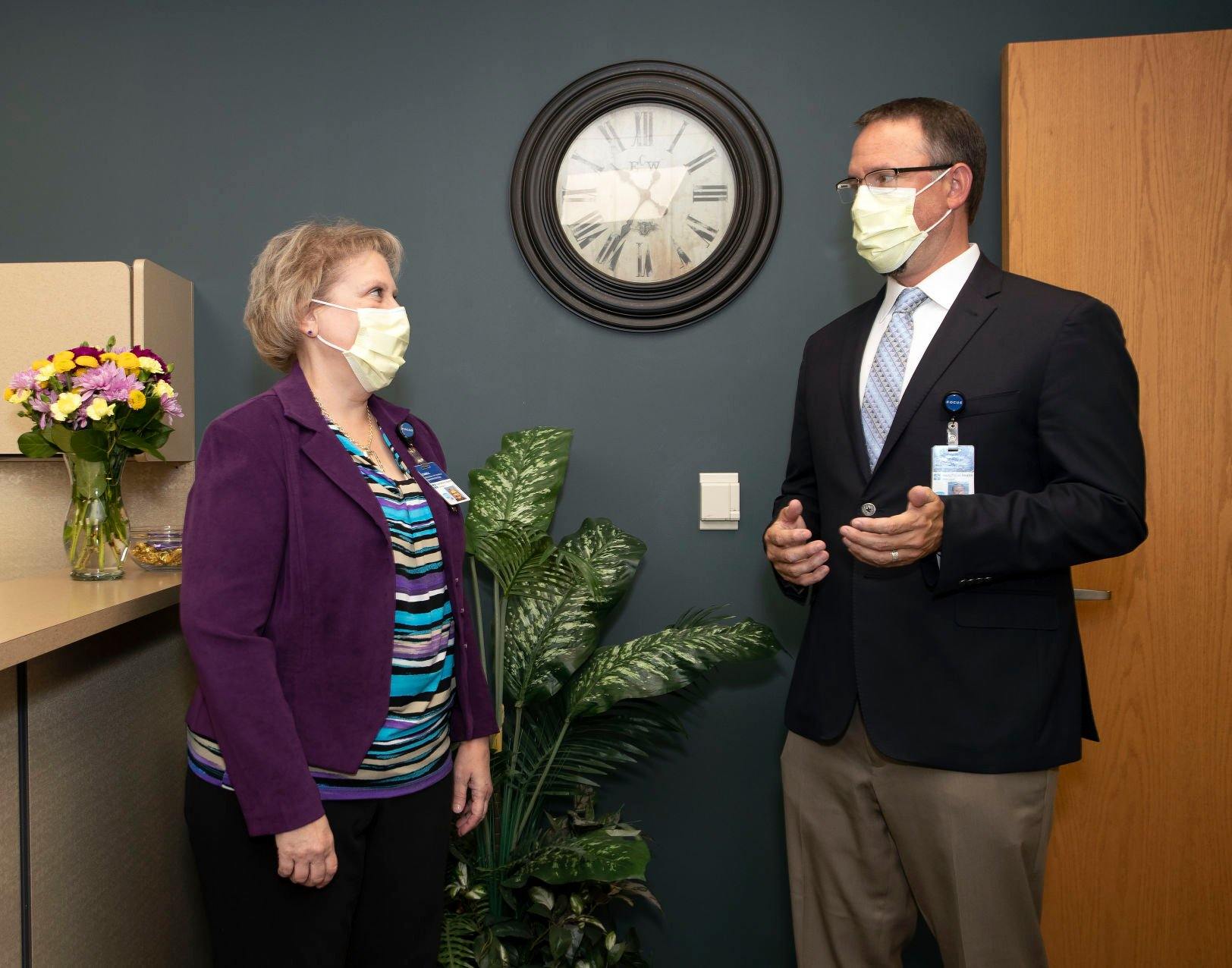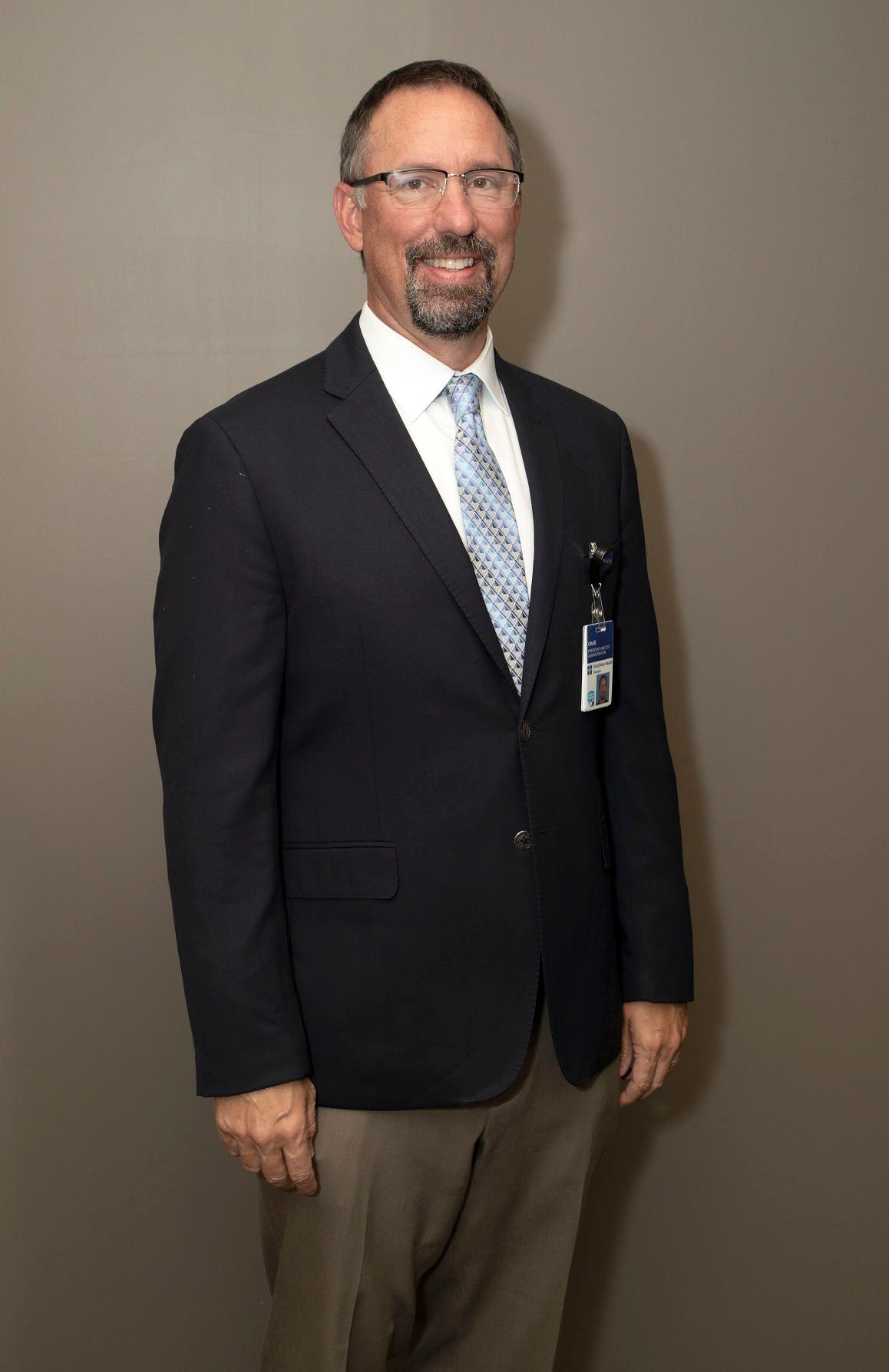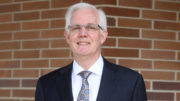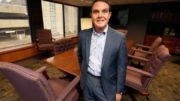Chad Wolbers, President and CEO, UnityPoint Health — Dubuque
Chad Wolbers, president and CEO of UnityPoint Health — Dubuque, has more than 22 years of experience leading hospitals and health care systems in various roles.
A Dubuque native, Wolbers earned his master’s of health administration degree from the University of Iowa and a Bachelor of Science degree in biology from Truman State University. He and his wife Dr. Regan Wolbers reside in Dubuque with their three children, Kenna, Josie and Gavin, and their puppy, Sully.
In his free time, Wolbers enjoys supporting his children in various activities, getting out on the Mississippi River and cheering on the Iowa Hawkeyes.
Career highlights, past recognition and awards include:
• Current member of Rotary and board member of Dubuque Area Chamber of Commerce, Greater Dubuque Development Corp. and National Mississippi River Museum and Aquarium.
• Selected into the Dubuque Senior High School Athletic Hall of Fame, 2016.
• Iowa Hospital Association Young Executive of the Year, 2011, “Provided to an executive under the age of 40 whose achievements and leadership are noteworthy for health care in Iowa.”
• Tri-State Business Times Rising Star Award, 2011.
• The Finley Hospital, You Make a Difference Award Winner, April 2011.
• Ottumwa (Iowa) Regional Health Center, Above and Beyond Award, 2006.
• John Colloton Award, graduate program in hospital and health administration, University of Iowa, 1999. Presented annually by the Alumni Association to the member of the graduating class who, in the perception of his/her classmates, has exhibited outstanding leadership and holds tremendous potential for making distinguished contributions to the profession of health care management.
Can you name a person who has had a tremendous impact on you as a leader?
Definitely my parents, Mark and Joanna, had the biggest impact on me. The example they set in raising their three boys in a loving, yet disciplined household is at the foundation of my leadership approach i.e., just because much is expected from our leaders during difficult times, doesn’t mean we don’t empathize or care about what they are navigating through.
Additionally, I will confess that I did have a rascally stretch in my younger years that afforded me the “opportunity” to meet with a youth counselor at Hillcrest Family Services, thanks to my parents’ decision to engage this wonderful resource. At the end of that visit, I was asked by him for the first time in my life, “Chad, are you a leader or are you a follower?” I responded that I wanted to be a leader and at that exact moment, a new path arose before me, and I’ve been on that journey ever since. Because of that experience, I served as board member earlier in my career and remain a proud Hillcrest board member alumnus to this day.
What are the most important decisions you make as a leader of your organization?
While I am not a member of our team that directly cares for patients in our facility, I take seriously and sincerely my responsibilities to ensure that, first and foremost, our organization provides safe and high-quality care.
My priority is to work with our hospital board and team members, including our providers, to ensure the right policies, procedures and protocols are in place to allow our team members to do their best work and live out our mission of “improving the health of the people and the communities of the tri-state area.” Due to the exceptional and compassionate work done by our teams, I am so proud of our hospital being named a Medicare 5 (out of 5) star hospital for overall quality of care, which places us in the top 12% of hospitals across the country.
As an organization gets larger, there can be a tendency for the “institution” to dampen the “inspiration.” How do you keep this from happening?
This question jumps to a whole other level when you consider what hospitals and health care organizations have been through, and are moving through, during the past few years.
At UnityPoint Health, people are what is most important, which is why we are focusing on employee morale and emotional well-being as one of the pillars of our organization’s new five-year strategic plan. We know our workforce has experienced trauma and difficult times during the past few years, which is why we place utmost importance on our emotional recovery.
Our team members matter — not only to our patients and to their colleagues, but they also matter to their communities, their families and most importantly, themselves. We want to help them show up and be present in all these areas of their lives, because that is when inspiration happens.
On this point, I do feel like we are on the right track. We have received positive feedback from team members during one of our recent team member engagement surveys, which affirms our commitment to supporting our team members and cultivating an environment they want to work in.
Which is more important to your organization — mission, core values or vision?
At UnityPoint Health, our values are highly influential in how we approach our mission. To me, our values drive our behaviors and in turn, our collective behaviors comprise our culture. My firm belief is that you cannot be successful on mission, vision or strategy if you don’t have the right values and accompanying culture. Our values reflect one word: FOCUS, which stands for fostering unity, owning the moment, championing excellence, UnityPoint Health and seizing opportunities.
What is one characteristic that you believe every leader should possess?
It goes without saying that you must have integrity to be a leader. Morally corrupt leaders will lead to corrupt and soon failed organizations. The need to have integrity is a given, so beyond that I would say that leaders need to have humility. They need to put others ahead of themselves and look at themselves as a servant to their mission and those that bring the mission to life; patients, families, board members, volunteers, providers and team members.
What advice do you have for future leaders?
In the first year of my career, I was gifted James Autry’s book, “Love and Profit; the Art of Caring Leadership,” by my first boss and mentor.
It dives deep into the leadership philosophy that proper and effective leadership involves authentically caring for people, not just manipulating them or treating them like a cog in a machine.
Emotional Intelligence (EQ) is just as, if not more, important than IQ. My advice would be to first understand what EQ truly is, then assess yourself from this perspective. Should you learn that you have various deficits, EQ related skills CAN in fact be learned, developed and applied to the benefit of those you lead. At the same time, I would recommend leveraging your EQ strengths to the benefit of your approach and mission as well.
What lessons can leaders take away from the current pandemic?
On this topic I could write a book. A lesson that we have learned here is that no matter how hard it gets, if you focus on your purpose and center yourself around this, you can get through anything.
Throughout this pandemic our team has had two choices: We could either pull together or we could fall apart. We collectively pull together each and every day because we share a common and critical purpose that serves to improve, and quite literally, save lives. By allowing that thought to be a guide for how we approach trials and tribulations, personally and professionally, we are better enabled to overcome challenging times.
What are two or three of the best things about being a leader?
1. You have the privilege to be a part of something greater than oneself. To experience a sense of purpose and belonging.
2. You have the opportunity to make a positive contribution in the lives of others that rely upon you and your organization either as a team member or patient.
3. You have the honor of being handed the sacred baton to ensure your organization’s mission carries forward, while endeavoring to leave it better than you found it.







